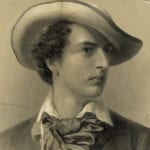 History
History  History
History  Health
Health 10 Everyday Activities That Secretly Alter Consciousness
 History
History Top 10 Historical Disasters Caused by Someone Calling in Sick
 Animals
Animals 10 New Shark Secrets That Recently Dropped
 Movies and TV
Movies and TV 10 Forgotten Realities of Early Live Television Broadcasts
 Technology
Technology 10 Stopgap Technologies That Became Industry Standards
 Weird Stuff
Weird Stuff 10 Wild Facts About Taxidermy That You Probably Didn’t Know
 Travel
Travel 10 Beautiful Travel Destinations (That Will Kill You)
 Miscellaneous
Miscellaneous 10 Modern Marriage Rituals Born from Corporate Branding
 Weird Stuff
Weird Stuff Ten Bizarre Visions of 2026 from Fiction
 History
History 10 “Modern” Problems with Surprising Historical Analogs
 Health
Health 10 Everyday Activities That Secretly Alter Consciousness
 History
History Top 10 Historical Disasters Caused by Someone Calling in Sick
Who's Behind Listverse?

Jamie Frater
Head Editor
Jamie founded Listverse due to an insatiable desire to share fascinating, obscure, and bizarre facts. He has been a guest speaker on numerous national radio and television stations and is a five time published author.
More About Us Animals
Animals 10 New Shark Secrets That Recently Dropped
 Movies and TV
Movies and TV 10 Forgotten Realities of Early Live Television Broadcasts
 Technology
Technology 10 Stopgap Technologies That Became Industry Standards
 Weird Stuff
Weird Stuff 10 Wild Facts About Taxidermy That You Probably Didn’t Know
 Travel
Travel 10 Beautiful Travel Destinations (That Will Kill You)
 Miscellaneous
Miscellaneous 10 Modern Marriage Rituals Born from Corporate Branding
 Weird Stuff
Weird Stuff Ten Bizarre Visions of 2026 from Fiction
10 Insidious Villains Of American Political History
American political history is remembered mostly for its heroes—George Washington, Thaddeus Stevens, the Roosevelts—but it is also ripe with villainy. Some historical wrongdoers, of course, have earned infamy, such as Jefferson Davis, William “Boss” Tweed, and Joe McCarthy. Others, like those on this list, have faded from the collective consciousness of the American populace.
10 Henry Styles Bridges
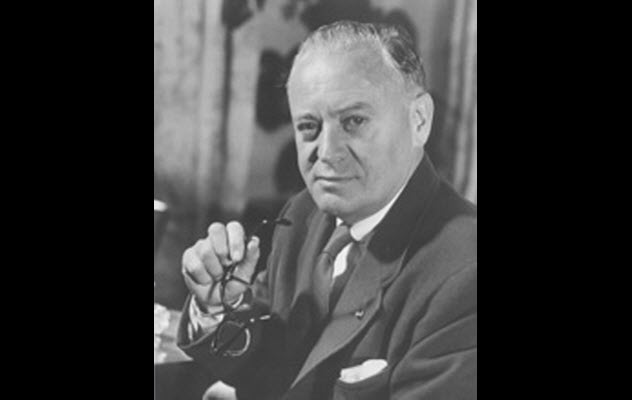
A Republican senator from New Hampshire from 1937 until his death in 1961, Henry Styles Bridges was an uncommonly ardent anticommunist and a steadfast defender of the more famous Joseph McCarthy. Bridges is one of the few to have voted against McCarthy’s censure in 1954. He also supported the “witch hunts” which took place during the second “Red Scare” as well as the persecution of gay civil servants during the so-called “lavender scare.”
These actions alone would convince many that he was an unsavory character, but his infamy lies in his treatment of Democratic Senator Lester Hunt of Wyoming in 1953–54. Hunt’s son was gay and had been arrested for trying to solicit sex from an undercover policeman. Bridges threatened to publicize the homosexuality of Hunt’s son if Hunt did not withdraw from the upcoming senatorial election in Wyoming.
Senator Hunt refused to end his reelection campaign. He also introduced Senate rules which would have ended some of McCarthy’s demagogic behavior. Bridges again threatened to reveal Hunt’s secret, causing him to fall into a deep depression. On June 19, 1954, Hunt shot and killed himself with a rifle at his Senate desk.
Bridges remained in the Senate until his death seven years later.
9 Pat McCarran
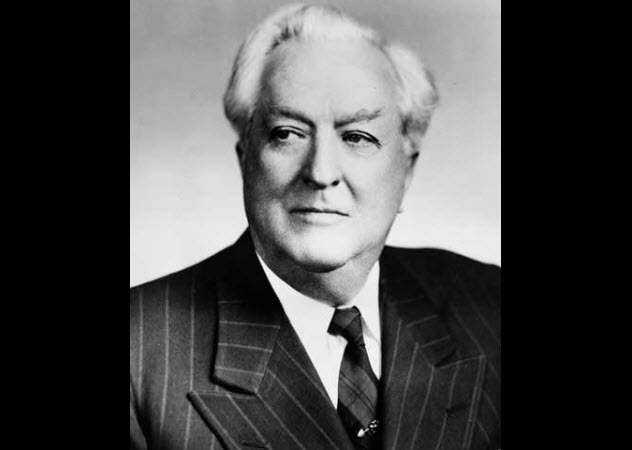
Senator Pat McCarran of Nevada was a member of the overzealously anticommunist group of senators who collaborated with and supported Joseph McCarthy. Unlike McCarthy, however, McCarran was less focused on demagoguery to promote his “brand” and more focused on putting McCarthy’s words into concrete legislation.
McCarran’s magnum opus was the Internal Security Act of 1950. The law ordered all communist organizations to register with the attorney general and created a board to investigate people suspected of being communist sympathizers. Those individuals found to be “reds” were barred from leaving the country or hiding membership in a communist organization when applying to work in government. Although President Harry Truman vetoed the law, arguing that it “would betray our finest traditions” and “curb the simple expression of opinion,” the president’s veto was overridden.
McCarran also wrote the Immigration and Nationality Act of 1952, which allowed the government to restrict visas and citizenship based on political affiliation. This meant that many esteemed international figures—including Gabriel Garcia Marquez and Pierre Trudeau—were not allowed to enter the country.
When McCarran died in office in 1954, his name was held in rather high regard. However, decades later, his position as a political boss prone to using patronage, his anti-Semitism, and the Supreme Court’s ruling that several provisions of the Internal Security Act were unconstitutional have tarnished his reputation.
8 James K. Vardaman
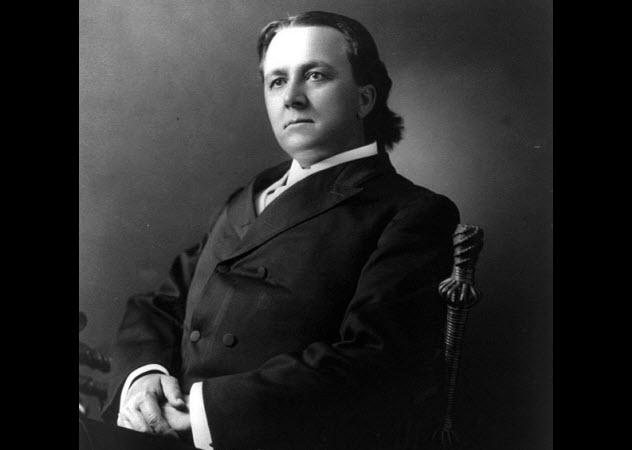
In 1903, the people of Mississippi chose James K. Vardaman, a representative in the Mississippi Legislature, to be governor. On many issues, Vardaman was a progressive: He supported an anti–child labor law and fought against the convict lease system. In a system shockingly similar to slavery, the convict lease system lent convicts—the vast majority of whom were African American due to the era’s pervasive racism—to farmers and corporations as free labor.
But his greatest legacy is his racism, which bordered on sadism. In true “The Most Dangerous Game” fashion, Vardaman enjoyed releasing a convict from prison and giving him a morning’s head start before “[leading] a mounted posse, complete with prison bloodhounds, on a mock hunt” for the terrified man. Vardaman openly advocated the notoriously cruel practice of lynching, saying that “if it is necessary every Negro in the state will be lynched; it will be done to maintain white supremacy.”
Vardaman did not believe that African Americans could ever become civilized. Instead, he believed that African Americans were condemned to an eternal position of servitude to whites. Thus, he proposed the elimination of all public schools serving African Americans and the repeal of the 14th and 15th Amendments, stripping African Americans of their citizenship and their accompanying rights. Vardaman even suggested that education succeeded only in “making a criminal of him and impairing his usefulness and efficiency as a laborer. [ . . . ] Slavery is the only process by which he has ever been partially civilized. God Almighty created the Negro for a menial, he is essentially a servant.”
Four years after his term as governor of Mississippi ended in 1908, he ran for a seat in the US Senate and won. Due to his opposition to Woodrow Wilson, Vardaman lost reelection in 1918. He died in 1930.
7 John E. Rankin
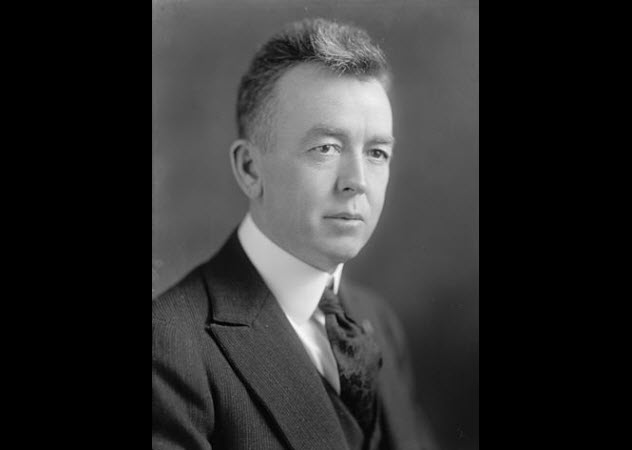
If there were an award for the figure most often on the wrong side of history, Mississippi Congressman John E. Rankin would surely be the front-runner for it. Rankin, who served from 1921 to 1953, was one of the most vicious bigots that Congress has ever seen.
A sympathizer of the Ku Klux Klan, Rankin was a leading force in the disenfranchisement of African Americans for decades. Stating that the US lost battles because of the cowardice of African-American soldiers, Rankin successfully halted efforts to allow African-American soldiers fighting in World War II to vote. He also steadfastly opposed efforts to curb lynchings.
Rankin was an avowed anti-Semite and Japanophobe. He proposed incarcerating all Japanese Americans in camps and quietly threatened American Jews with an American holocaust, saying that Jews “have been run out of practically every country in Europe in the years gone by, and if they keep stirring race trouble in this country and trying to force their communistic program on the Christian people of America, there is no telling what will happen to them here.”
Perhaps the best example of Rankin’s horrid character is this infuriating story: At a naval munitions center in California in 1944, a large explosion killed 320 soldiers, the majority of whom were African-American officers segregated from their white counterparts. Congress debated giving $5,000 in aid to each of the victims’ families. But Rankin argued to lower the payment considerably because of the dead soldiers’ race. Ultimately, the amount was reduced by 40 percent to $3,000 per family.
6 Jesse Helms
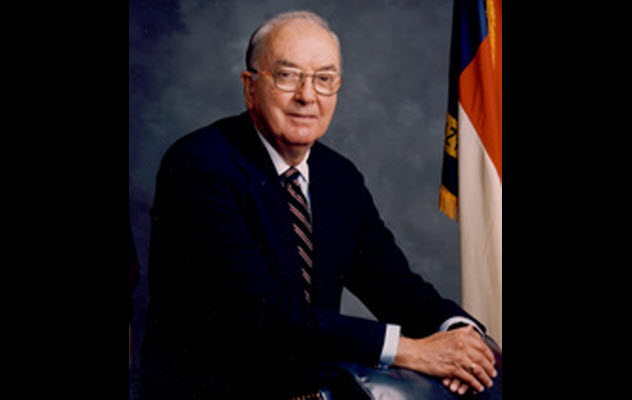
Jesse Helms, a US Senator from North Carolina from 1973 to 2003, is the most contemporary of this collection of political villains. Called “the last prominent unabashed white racist politician in this country” by The Washington Post, Helms never apologized for his racism and showcased it for his whole career. He made ample use of racial subtext as a campaign tool.
In 1990, when his bid for reelection was challenged by an African-American candidate, Helms released the now-infamous “white hands” campaign ad, which depicted white hands crumbling a rejection slip while a narrator’s voice declared, “You needed that job and you were the best qualified. But they had to give it to a minority because of a racial quota.” He supported the apartheid regime in South Africa and led the opposition to making Martin Luther King Jr. Day a national holiday.
Helms was also an archnemesis of sorts of the gay community. When President Bill Clinton nominated an openly lesbian woman to an assistant secretary position in the Department of Housing and Urban Development, Helms opposed the appointment by saying, “I’m not going to put a lesbian in a position like that.” After President Clinton wanted to integrate gays into the military, Helms threatened that “[Clinton had] better have a bodyguard” if he went to North Carolina. In 1987, Helms authored an amendment (which was adopted) to a bill that banned anyone with HIV from traveling or immigrating to the US.
Helms was also opposed to federal funding for HIV/AIDS research, saying that the disease was spread by “unnatural” and “disgusting” homosexual relations. Helms blocked the funding repeatedly in the Senate, prolonging the AIDS crisis. “Nothing positive happened to Sodom and Gomorrah, and nothing positive is likely to happen to America,” he said, “if our people succumb to the drumbeats of support for the homosexual lifestyle.”
5 Benjamin ‘Pitchfork’ Tillman
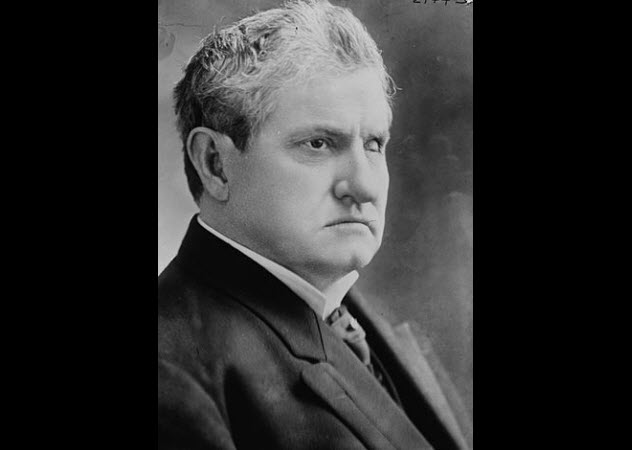
A prominent South Carolina politician of the late 19th and early 20th centuries, Benjamin Tillman not only promoted discrimination but also personally took part in violence against African Americans.
As the leader of the “Red Shirts” (a paramilitary group similar to the Ku Klux Klan) in 1876, 29-year-old Tillman participated in the “Hamburg Massacre,” in which six African Americans were murdered. He was never tried for his crimes.
Fourteen years later, Tillman was elected governor of South Carolina, using his position to encourage the lynching of African Americans as punishment for alleged sexual misconduct. The frequency of lynching soared under his leadership.
After his term as governor was complete, Tillman joined the US Senate. He earned his nickname, “Pitchfork Ben,” by threatening to stab President Grover Cleveland with the tool. Infamous for a fistfight he had on the Senate floor, he was so hated by President Theodore Roosevelt that he was banned from entering the White House.
4 Laurence Keitt
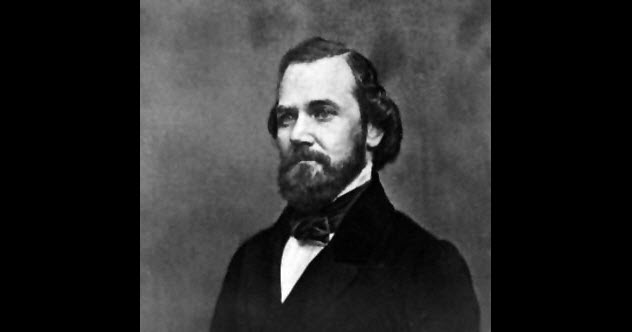
In the prelude to the Civil War, one of the most despicable political groups was the so-called “Fire-Eaters,” a faction of radical, proslavery Southern politicians who promoted secession and rejected all proposed compromises to keep the Union intact. Of these extremists, the most violent and ardently proslavery was Laurence Keitt, who was elected to Congress in 1852.
In 1856, Keitt became well-known in Washington, DC, when he helped Representative Preston Brooks brutally beat Senator Charles Sumner with a cane by threatening any of Sumner’s would-be saviors with a pistol. Two years later, Keitt started a massive brawl in the House of Representatives by trying to strangle Pennsylvania Representative Galusha Grow for insulting his devotion to slavery. Keitt was perhaps too busy beating on his fellow Congressmen to sponsor any significant bills, but he led many campaigns to expand slavery, including one to annex Cuba and make it a slave state.
When South Carolina seceded, Keitt became a Confederate politician, even signing the Constitution of the Confederate States. After the Civil War started, Keitt fought in the war as a brigadier general. In 1864, he was wounded during battle and died of his injuries.
3 George Wallace
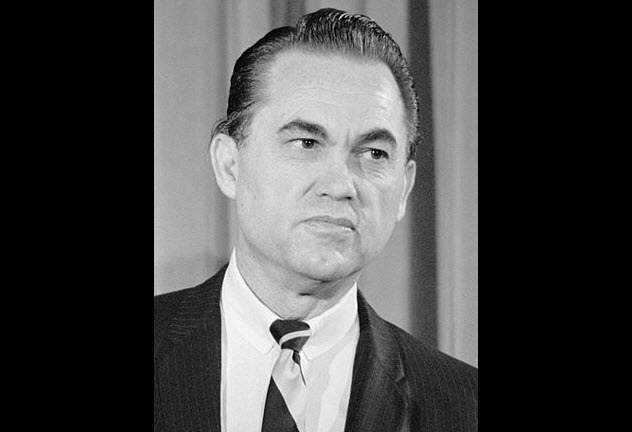
In 1968, a divided nation was reeling from the bloody Vietnam War and bitter battles over civil rights. Alabama Governor George Wallace, an ardent segregationist who had once promised “segregation now, segregation tomorrow, segregation forever,” ran on a platform of “law and order” as the candidate of the American Independent Party. Known as the embodiment of opposition to the civil rights movement, he was determined to rescind the progress made by African Americans during the 1950s and ‘60s.
With his stronghold only in the Deep South, Wallace knew that he could never win the general election. Although he presented himself as a legitimate presidential candidate, he actually had another goal in mind. He wanted to siphon off enough votes to prevent the declaration of a winner in the electoral college. That would throw the election to the House of Representatives, where Wallace intended to use his significant influence to determine the winner, selecting whichever candidate agreed to enact laws restoring segregation.
On Election Day, Wallace won the states of Georgia, Alabama, Mississippi, Louisiana, and Arkansas, which was not enough to bring his plan to fruition. If Wallace had won the states of Tennessee, South Carolina, and North Carolina, all of which he came close to winning, the election would have been thrown to the House, and Wallace’s plot may have succeeded. If Wallace had gotten his way, many of the advances by African Americans made during the 1950s and ‘60s would almost certainly have been reversed.
Wallace did succeed, however, in using racial tensions to his advantage. This stratagem inspired the conservative Southern Strategy, the use of coded racism to appeal to Southern voters, which was exploited by a large number of conservative politicians, including the previously mentioned Jesse Helms. In 2005, the chairman of the Republican National Committee formally disavowed Wallace’s influence on his party by apologizing for his party “[benefiting] politically from racial polarization.”
2 Huey ‘Kingfish’ Long
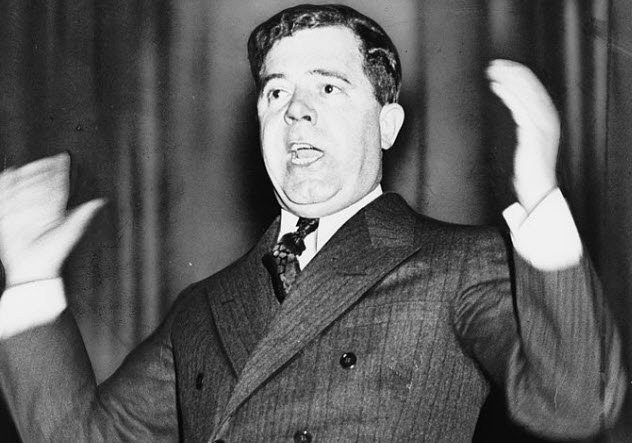
Few Americans have a legacy as controversial as that of Huey Long. As governor of Louisiana from 1928 to 1932 and later as a US Senator, Long certainly made great contributions to his state. He shifted the tax burden from the poor to the rich, expanded welfare for the poor, and spent considerable sums on infrastructure. But there was a dark side to his legacy.
Long was a radical populist whose tactics mirrored those of Benito Mussolini. Using intimidation and bribery to pass his reforms, Long had nearly complete control over his state, earning him a reputation as an American dictator.
In 1932, he joined the US Senate and began plotting his election to the presidency. In 1934, Long released his “Share Our Wealth” proposal, which called for the confiscation of upper-class wealth and a guaranteed income for all Americans. President Franklin Roosevelt considered him “one of the . . . most dangerous men in America” for this redistribution program, which would have hugely empowered the government and given Long nearly unlimited powers as president.
Long continued planning for his presidency, even writing a book entitled My First Days in the White House. His rising popularity horrified Nobel Prize–winning author Sinclair Lewis, who wrote the play It Can’t Happen Here, which depicted a populist politician being elected president before becoming a Nazi-like dictator. Pulitzer Prize–winning journalist and novelist Katherine Anne Porter openly called Long “the worst sort of Fascist demagogue.”
Before Long could begin his campaign, however, he was assassinated by a crazed physician.
1 Aaron Burr
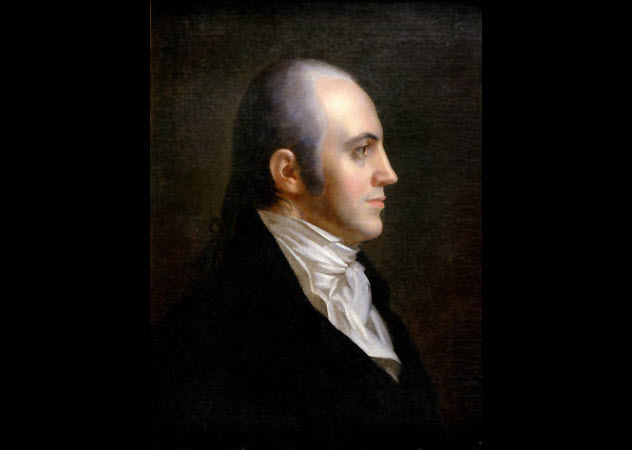
Aaron Burr is well-known for his killing of Alexander Hamilton in an 1804 duel. But what is forgotten about Burr is what happened next: his attempt to found his own empire and betray his nation.
After Hamilton’s death, Burr remained vice president. When President Thomas Jefferson’s first term ended in 1805 and Burr was replaced with George Clinton, Burr decided to look to the West for his future. He soon hatched a plot to use a small army to seize a sizable part of the Louisiana Territory and Mexico and declare himself emperor. He contacted Anthony Merry, the British minister to the United States, about the possibility of Britain helping him conquer the land. Burr also conspired with James Wilkinson, the senior officer of the US Army, who ultimately double-crossed Burr.
After Wilkinson began to believe that Burr’s plan would fail, Wilkinson sent a letter to President Jefferson proclaiming his own innocence while accusing Burr of treason. Arrested in early 1807, Burr was found “not guilty” on the grounds that he had not actually engaged in an “overt act,” which meant actually conquering land in his case.
Despite his acquittal, Burr was viewed as a traitor in the eyes of the American people. He spent the rest of his life in obscurity and died in 1836.
D.E. Oks enjoys fencing, language learning, studying history, reading, cooking, and being with his dog, Mischa.





